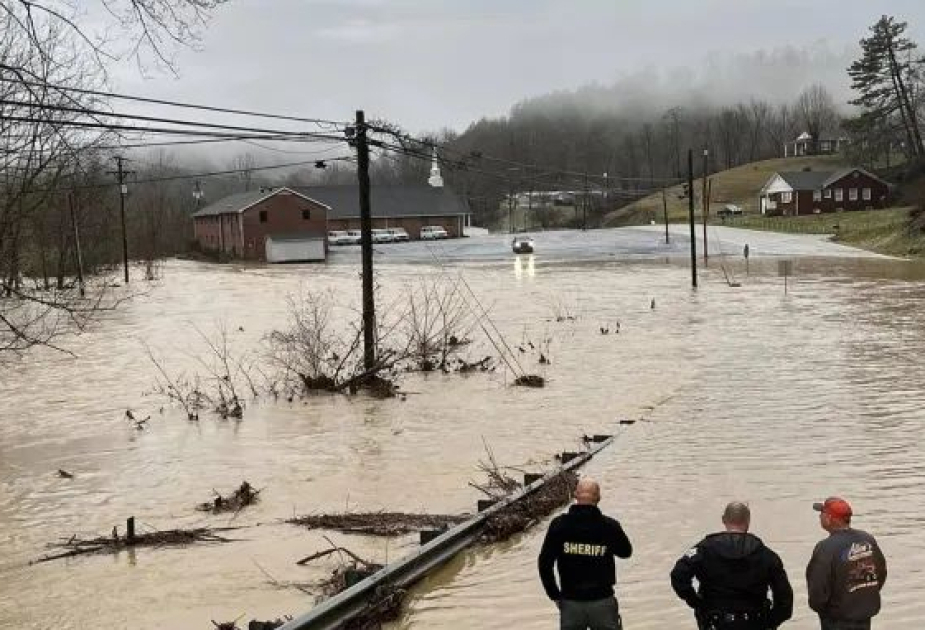At least nine people have died over the weekend, as torrential downpours drenched parts of the south-eastern US, submerging roads and houses, BBC reported.
Kentucky Governor Andy Beshear said eight people had died in his state and suggested at a news conference on Sunday that the total could go up.
Hundreds of people stranded in flood waters, many stuck in their cars, had been rescued, and Beshear warned residents to "stay off the roads right now and stay alive".
In Georgia, the ninth death was recorded after a man lying in his bed was struck by an uprooted tree that crashed into his home.
Kentucky, Georgia, Alabama, Mississippi, Tennessee, Virginia, West Virginia and North Carolina were under some type of storm-related alert this weekend. Almost all of those states suffered catastrophic damage in September from Hurricane Helene.
Between the eight states, more than half a million households were without power on Sunday night, according to poweroutage.us.
A bulk of the death and destruction appears to have occurred in Kentucky, where a mother and her seven-year-old child and a 73-year-old man were among the dead.
Some parts of Kentucky received up to 6in (15cm) of rain, National Weather Service (NWS) figures show, resulting in widespread flooding issues.
The rapid influx of rain caused river levels to rise quickly and trapped vehicles in feet of water, images posted online show.
Governor Beshear wrote on X that there were over 300 road closures.
He also said that he had written to the White House requesting an emergency disaster declaration and federal funds for affected areas, according to the BBC's partner CBS News.
President Donald Trump approved the declaration on Sunday, authorising the Federal Emergency Management Agency (Fema), which he has suggested abolishing, to co-ordinate disaster relief efforts.
Officials have cautioned that the worst of the flooding is not over yet.
"The rivers are still going to rise," Eric Gibson, director of the Kentucky Division of Emergency Management, said on Sunday.
Bob Oravec, a senior forecaster with the NWS, said: "The effects will continue for a while, a lot of swollen streams and a lot of flooding going on."
In Obion County, Tennessee, heavy rains there caused a levee to break, "resulting in rapid onset flooding", a local NWS account said on X.
"If you are in the area, GET TO HIGH GROUND NOW! This is a LIFE THREATENING situation," the post said.
The town of Rives along the Obion River was deluged from the breached flood barrier.
Footage shows brown water rushing over rocks and past trees, as rescue workers in red boats pass flooded homes.
Steve Carr, the Obion County mayor, declared a state of emergency on Facebook and said there would be mandatory evacuations in Rives because of "the rising water, no electricity, and freezing temperature creating a life-threatening situation".
Located north-east of Memphis, Rives has a population of roughly 300.
West Virginia Governor Patrick Morrisey issued a state of emergency in 10 counties on Saturday and added another three counties to the list on Sunday.
"Please continue to be cautious," Morrisey said on X.
Kristi Noem, head of the Department of Homeland Security, which oversees Fema, said she had been in contact with both Governors Beshear and Morrisey, and left voicemails with Governors Bill Lee of Tennessee and Kay Ivey of Alabama.
"While emergency management is best led by local authorities, we reinforced that DHS stands ready to take immediate action to offer resources and support," Noem said.
Meteorologists have also warned that a polar vortex is making its way early this week towards the northern Rocky Mountains and northern Plains in the middle of the country.
In Colorado, temperatures could drop to as low as 14F (-10C), with the city of Denver reportedly opening shelters for its homeless population this weekend.




















